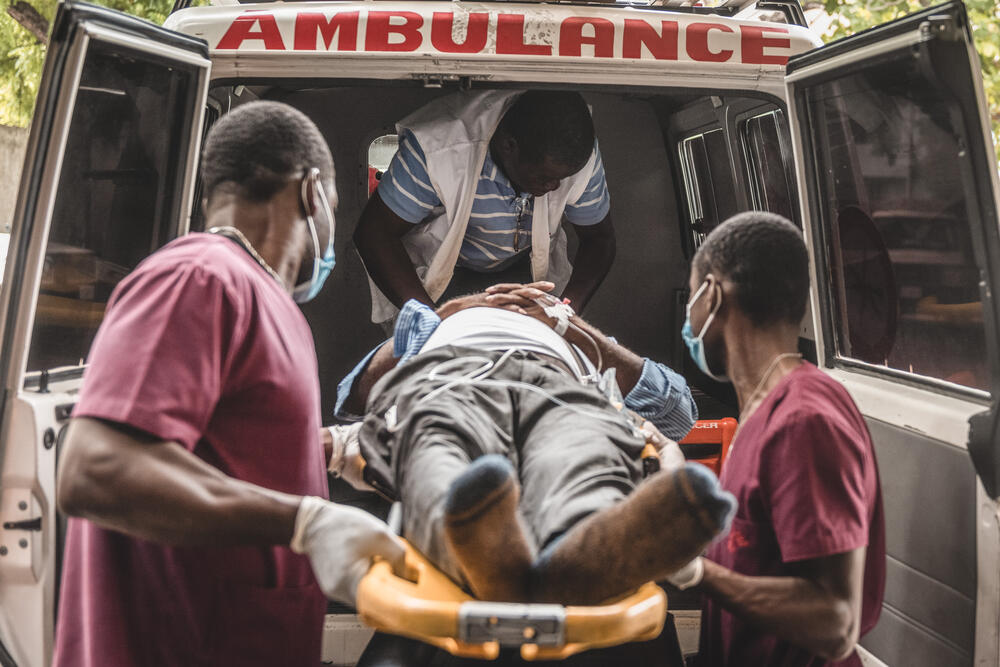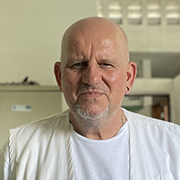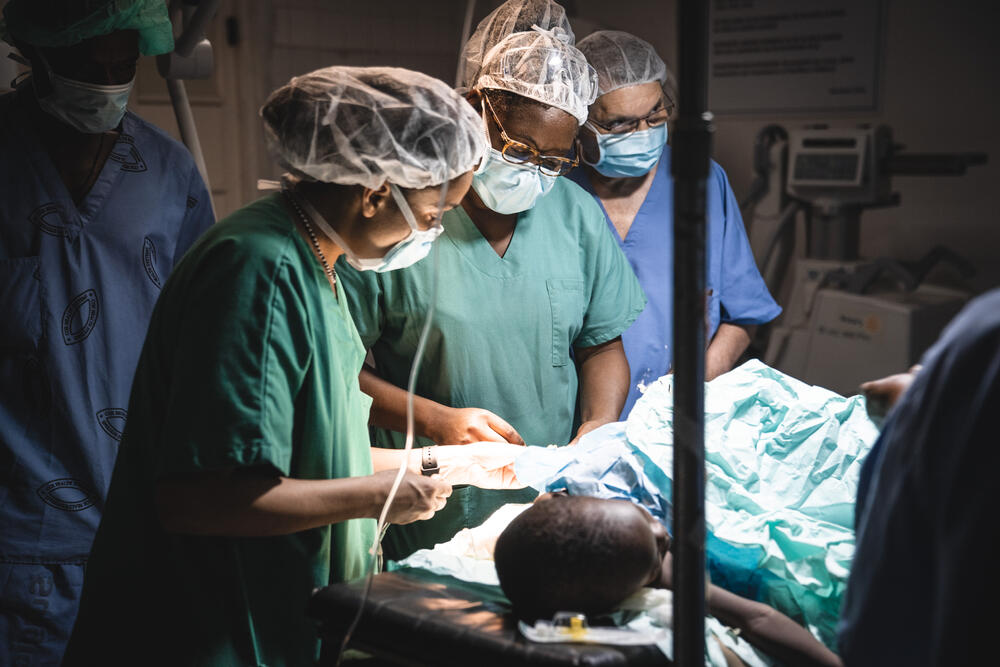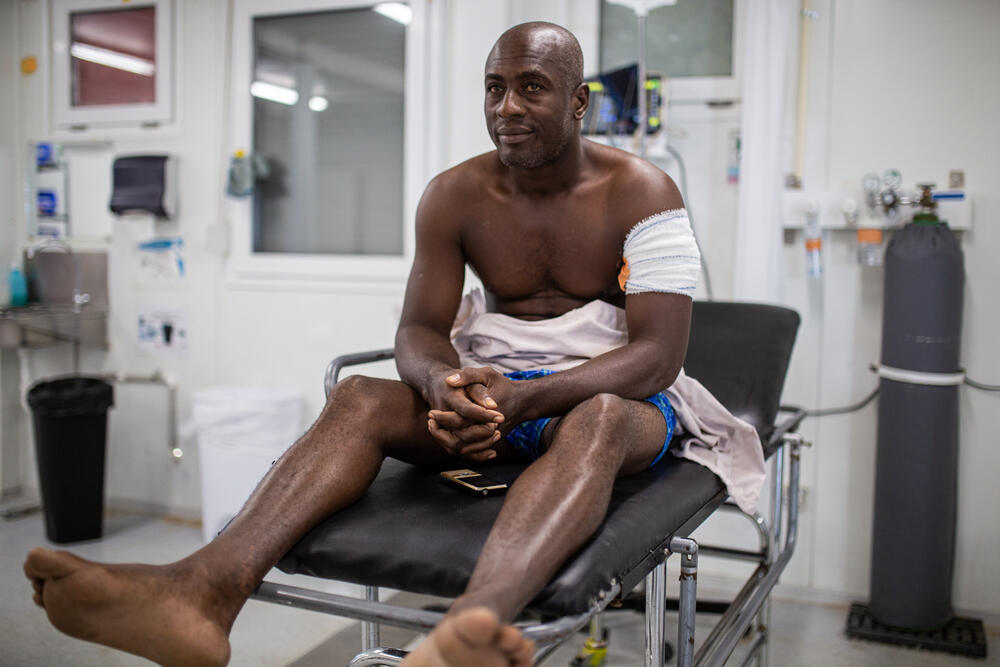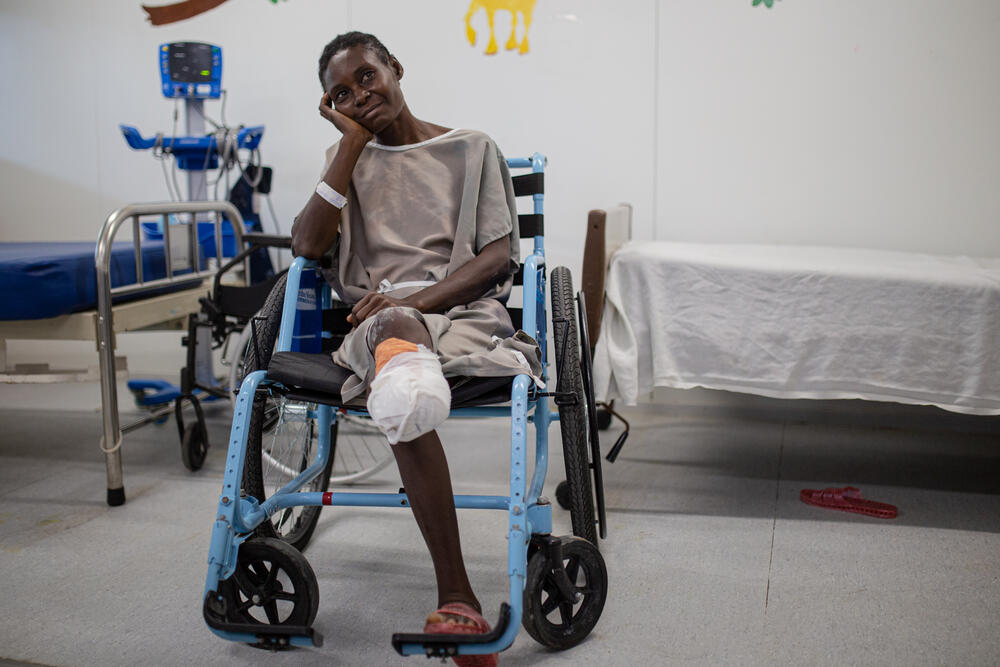Haiti: The three MSF principles that keep our staff and patients safe
Port-au-Prince, the capital of Haiti, has seen waves of clashes between armed groups. The violence has driven a stark need for emergency trauma care and surgery, and cut people off from the everyday healthcare services they need.
Nurse Amadeus von der Oelsnitz explains how the Médecins Sans Frontières / Doctors Without Borders (MSF) principles of neutrality, impartiality and independence help our teams provide vital healthcare in a city torn apart by insecurity.
Port-au-Prince in the early hours of the morning. I can feel the tension in our off-road vehicle - as always when we approach a roadblock. My team and I remain calm. An important basic rule that all MSF staff know.
Our driver slows down. Here, at the transition from one neighbourhood to the next, the balance of power in Haiti's capital is changing. Behind the barrier, a different armed group is in charge.
A few young men are standing behind a barricade made of car tyres, pieces of wood and stones. They carry rapid-fire rifles and raise their arms to signal us to stop. The men are checking who wants to come into their territory. And why.
“Let's be clear: the security of our staff and the patients who come to our services is always our top priority. We keep the dangers for them as low as possible.”
Never miss an update
Get the latest news on war and conflict with our email newsletter, Frontline.
You'll also receive our best stories, critical updates and unique ways to get involved.
When they discover our logo on our door, they smile. They know that we are on our way to our mobile clinic consultations. They are happy and greet us warmly:
"Hey, MSF!" they call.
"Merci, bon boulot!" one of them shouts out - thank you, good job!
I am relieved as we drive on. It's working, I think. And it’s because of exactly this – the joy about us and the acceptance of our work. These are essential parts of our approach to security.
Time and again, people interested in working with us have asked me:
"How can you actually work in conflict crisis areas? How do you protect yourselves?"
Let's be clear: the security of our staff and the patients who come to our services is always our top priority. We keep the dangers for them as low as possible.
The greatest risk for accidents and assaults for our teams is when we move from A to B – for example on the way to a clinic, which in Haiti we always did in convoy with several vehicles.
How can we prevent danger on these routes? The most important thing is to communicate with all those in power. In Haiti, this meant that we met regularly with all the armed groups.
Neutrality and independence
Usually, our project coordinators talk to the group leaders. They explain to them when we would like to visit their area and where we would like to offer medical consultations.
We inform them that it is our task as humanitarian aid workers to treat them and the people in their neighbourhood, but that we will also be at their opponents’ neighbouring quarter the following day to hold a consultation there.
When the groups have understood and accepted this principle of neutrality, we can work well.
Often, those in power ask us why we are providing aid – who our donors are. Then we explain that we receive donations from many private individuals worldwide who simply want to help. And that there are no political or economic interests behind our work.
This is an extremely important aspect of acceptance and security. So a thank you goes out to all those who support us with donations.
Help us save lives in conflict zones
The impact of conflict goes far beyond the frontlines. And so do we...
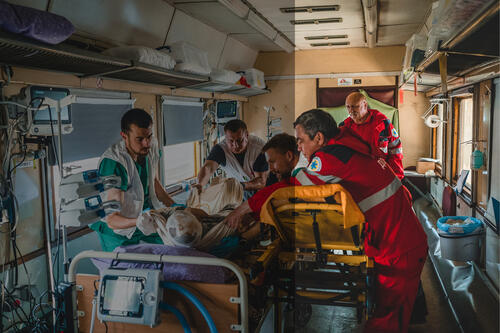
We have been active in Haiti for more than 30 years. The people in the country know us and they trust us.
Among other things, MSF provided life-saving emergency aid after the earthquake in 2010 and during the following years when a devastating cholera epidemic broke out. In my conversations with people, I heard again and again that they had personally received help from us or that family members had been saved by our teams.
That kind of thing connects.
Impartiality
Even those in power and their relatives need medical care. I experienced this first-hand in Haiti.
One day, several men came to our clinic with their pistols in their waistbands. I approached them and asked them to leave their weapons outside. This is also a basic rule for our security: no weapons are allowed in our clinics.
The men were initially indignant and wanted to take their turn immediately. I had to explain to them that our rules mean we decide who gets treated next based solely on medical necessity. Among others, mothers with seriously ill children were waiting in the room.
I was aware that I now had to appear confident. One of the men had a chronic gunshot wound. It was certainly unpleasant, but it was not time-critical. I managed to calm the situation down – and the man was later treated by our team, as were all the other patients.
“That's always a risk, even on the street, that you're in the wrong place at the wrong time – and get caught in the crossfire of fights that have nothing to do with you”
MSF's mission is to be there for the most vulnerable groups in crisis areas.
During my time in Haiti, we treated up to 100 patients a day during our mobile clinics. Many of our patients were pregnant women, elderly people with high blood pressure and diabetes, children with severe respiratory infections and diarrhoea, some acutely malnourished due to persistent infections.
Most of these illnesses are direct consequences of the living conditions. Thousands live in displacement camps in Port-au-Prince. There is no electricity, no washing facilities, no running water, many only sleep on cardboard boxes. Skin diseases such as scabies are widespread.
We also distribute food in the camps, provide drinking water and build latrines.
Sandbags and stray bullets
We offer some of our mobile clinics directly in the camps for displaced people, others in empty warehouses or former schools.
Once a week, we visit an abandoned health centre and practically put it back into operation for that short time. The building was quite close to the border between two rival neighbourhoods, which is why there were frequent gunshots in the area. On the first floor, we secured the windows and balconies with sandbags to be protected from stray bullets.
That's always a risk, even on the street, that you're in the wrong place at the wrong time – and get caught in the crossfire of fights that have nothing to do with you.
That's why we minimise this risk by never being out in the dark. After all, gun battles are more frequent at night. In addition, poor visibility increases the risk for our drivers, it facilitates robberies, and our logo on the car can be harder to recognise.
There were also rare days when we could not hold our medical consultations. We had received warnings from the armed groups or from the community that there could be fighting in our area of operation.
The risk of kidnapping
In Haiti, there is also a greatly increased risk of kidnapping. Some criminal gangs earn their money through kidnappings.
As we are in constant contact with the armed groups, we are well placed to prevent such situations. All groups know that MSF does not pay ransom. And again, the best protection is that our medical aid is important to everyone and no one wants to harm us.
However, if a kidnapping does occur, we immediately set up a specially trained team whose only concern is to ensure that the colleagues concerned are released as quickly as possible.
The risk of kidnapping is particularly high for our Haitian staff, who don’t live in MSF accommodation and have to travel to and from work. Unfortunately, we don't have a good solution for these situations, and it makes me angry that here it shows in miniature how unfair the world often is.
We generally moved around as little as necessary in Haiti. This meant that me and my teammates who lived on-site spent a lot of time in our accommodation, which was half flat and half office.
This is quite common when you’re working with MSF, and things like going for walks, meeting friends, going jogging or even shopping in the supermarket are always much more intense for me after such an assignment.
I then always realise how much it means that in Germany, where I’m from, we live in peace. I cannot choose where I was born. That's why I think it's all the more important that we also look at what's happening elsewhere and that we get involved.
I will not soon forget my time in Haiti.
MSF, war and conflict
In conflicts and war zones, MSF does not take sides. We provide medical care based on needs alone and try to reach the people who need help most.
If warring parties see aid organisations as being on one side of a conflict, we are less likely to gain access to those in need and more likely to be attacked.
